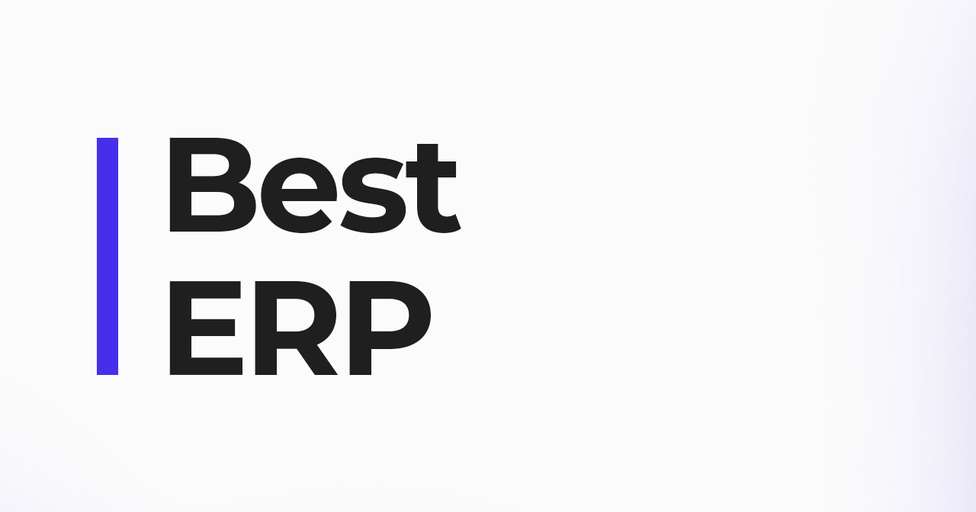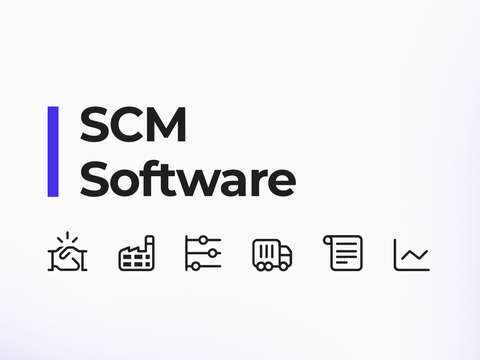Are you wondering which ERP software is the top ERP system in the USA? In this article, you’ll discover what an ERP system is and how to select the best for your digital business based on our comprehensive ranking.
With this guide, navigating the landscape of the most popular and used ERP systems will be straightforward, enhancing your ability to choose the right enterprise resource planning system with confidence.
Comparison table of best enterprise resource planning softwares in 2025
| ERP NAME | PRICE | COMPANY SIZE | DEPLOYMENT |
|---|---|---|---|
| SAP | $$$$$ | Large/ very large | On-premise |
| ORACLE | $$$ | Mid to large | Cloud-based |
| SAGE | $$ | Small to mid-sized | Cloud-based |
| ERPNEXT | $$$ | Mid to large | Cloud-based |
| DOLIBARR | $ | Small to mid-sized | Cloud-based & SaaS |
| KATANA | $$$ | Mid to large | Cloud, SaaS, Web-Based |
| ACUMATICA | $ | Small to mid-sized | Cloud-based |
| IFS | $$$$$ | Large/ very large | Cloud, SaaS, Web-Based |
| MS DYNAMICS | $$$ | Mid to large | On-premise & SaaS |
| SYSPRO | $$$ | Mid to large | Cloud, SaaS, Web-Based |
| INFOR | $ | Small to mid-sized | Cloud, SaaS, Web-Based |
| HOLDED | $ | Small to mid-sized | On-premise & on the cloud |
Top 12 most popular ERP systems and solutions
1. SAP
SAP is one of the best ERP systems in the world for large companies. SAP offers solutions to ease data processing and the flow of information between departments and even between organizations.
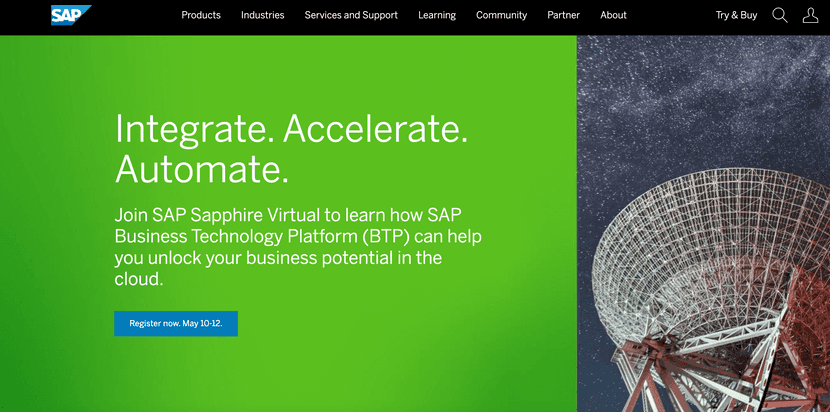
SAP has a “continuous innovation strategy” approach that helps businesses grow without limits, or, at least, without the limitations that are often imposed by an ERP system.
We won’t dive too deep into SAP since we already have an article that covers everything you need to know to understand what SAP is and why this system is so popular.
2. NetSuite (by Oracle)
Netsuite was one of the pioneers in the cloud computing revolution, being the first SaaS company in the world. Today, NetSuite belongs to Oracle and offers one of the best ERP systems for omnichannel companies all over the world.
Modules can be added to Netsuite to expand the functionalities of the ERP system, without compromising the deployment speed or the usability of the software system.
3. Sage
Sage is a British multinational business software company dedicated to offering an ERP system. Together with SAP and Netsuite, Sage is one of the most popular choices available.
Some of the competitive advantages of Sage are its usability, its level of customization (depending on size, industry or type of need), its short implementation time and its automatic back-ups that reduce the cost of data storage and reconciliation.
4. Infor
Infor is a multinational SaaS company. Originally, Infor was created as an ERP system for finance and resource planning, supply chain management and customer service. Nowadays, Infor has also developed specific solutions for different industries and an easy-to-use interface.
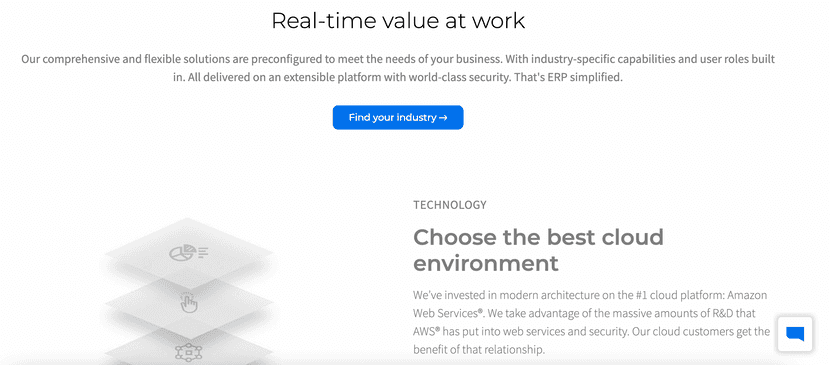
Infor is best suited for manufacturing companies since those were the original users of the platform at the beginning, but it still offers great tools and systems for other types of businesses as well.
Infor drives productivity by speeding up mainly production processes and fixing issues quickly. As a bonus point, Infor has a user-friendly interface that is consistent and highly effective.
5. Syspro
Syspro is a leading global ERP specialized in key manufacturing and distribution industries.
Syspro stands out from other ERP systems because of its focus on the manufacturing and distribution sectors and its approach to technology. This makes Syspro the perfect choice for businesses that manage production, but it can be adapted to multiple sectors and business types.
6. Microsoft Dynamics GP
MS Dynamics is a growing ERP by Microsoft. Microsoft Dynamics, which can function in conjunction with other systems, can be used to convert customer information into a source of sales, improve your marketing strategy and customer relations, personalize and optimize customer service, streamline finance-related tasks and adapt and speed up the supply chain of the company.
Microsoft prioritizes customization, usability and lower costs with this ERP system by, for example, allowing companies to customize the platform with simple codes.
7. IFS
The IFS ERP system is one of the best options for managing and strengthening business operations.
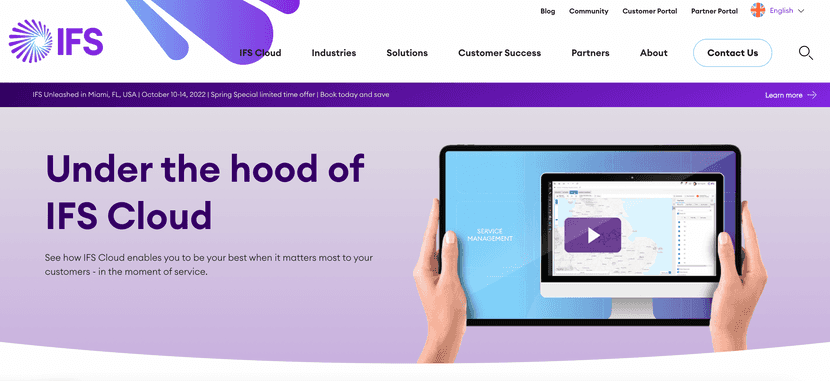
IFS is designed to drive business efficiency, reduce unnecessary costs and provide insights, all in a single platform.
This can be achieved through task automation and limiting the number of tools needed to carry out different processes, thereby minimizing integrations and the use of third-party tools.
8. Acumatica
Acumatica is an ERP system that works in the cloud and aims to improve business efficiency thanks to a user-friendly interface, cross-module workflows, responsiveness, high adaptability through low-coding or no-coding and the possibility to add or reduce the number of functionalities in the system as required for your business.
9. Holded
Holded is an all-in-one business management platform designed for small and medium-sized businesses. It offers accounting systems, CRM, inventory, and sales management, all in a cloud-based solution.
This ERP helps businesses automate and optimize daily operations, making decision-making easier and improving operational efficiency.
10. ERPNext
ERPNext is an ERP system that offers a free version, which is geared toward smaller companies, and ERPNext for Enterprise, which is for larger companies.
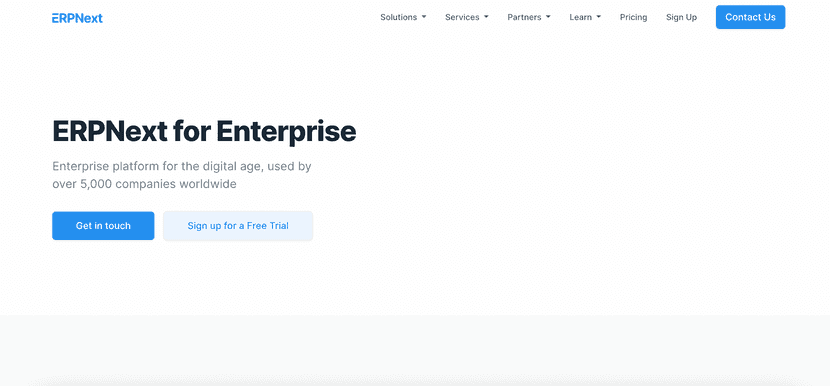
The Enterprise version includes a warranty for replicable bugs, aid during implementation, devOps support (installation, custom configuration on your servers, etc.), developer support for customizations and functional support to help you manage your configurations, permissions, workflows, notifications and module configurations.
ERPNext for Enterprise also comes with additional DB functionalities that will help larger companies to ingest their considerable data volume on a regular basis with ease.
11. Dolibarr
Dolibarr is an open-source ERP system that was designed with one principle in mind, and that’s simplicity —in terms of the development, installation and use of the ERP.
Dolibarr offers a multi-user system that includes its own permission system (with several levels for each feature) and an interface that can be customized through themes.
12. Katana
Katana is a manufacturing ERP that prioritizes usability and functionality, offering a platform that is powerful and easy to use.
This ERP system is constantly evolving and adding new functionalities based on customers’ demands. In this way, Katana scales with your business. Its end-to-end platform can be integrated with popular eCommerce platforms, accounting and reporting tools, and even allows you to create custom workflows with Katana’s open API to better define your processes.
What is an ERP system?
Enterprise resource planning systems, also known as ERPs, are software systems for the management and monitoring of all processes within a company.
They serve as a database —and a synchronized point of information— for all departments, thereby speeding up communication across the business.
The best ERP systems integrate many functionalities to automate tasks in different departments such as marketing, sales, logistics, post-checkout, finances, etc.
If needed, some of the best ERP systems come with the possibility to add modules to further expand their functionalities. In this way, ERP systems can be transformed into hubs for activities and information.
Should we prioritize the most used ERP programs? Important considerations
Choosing an ERP should not be based solely on its popularity.
Each company is unique, with specific needs and processes that the most used ERPs may not adequately fulfill.
The most commonly used systems often have limitations in customization and flexibility, crucial aspects for adapting the software to your specific requirements.
Moreover, the most popular ERPs almost always have a higher cost, not only in licenses but also in implementation and maintenance.
There are lesser-known alternatives that can offer a better balance between cost and functionality, allowing you to allocate resources to other strategic areas.
The relationship with the provider is vital for the long-term success of the implementation. In this regard, also consider the scalability of the ERP
A lesser-known but scalable system may better adapt to your changing needs as your business grows.
Therefore, opting for a suitable ERP instead of the most famous one can make the difference between a successful implementation and one that does not meet your expectations.
The decision should be strategic and personalized, ensuring that the chosen ERP, although not one of the top ERPs or the most used, aligns with your business objectives and provides you with a sustainable competitive advantage.
Outvio: the best alternative to traditional ERP softwares
Choosing Outvio can save you from making a significant investment in a traditional ERP system. Our platform offers comprehensive traceability for all post-sale processes, from order management to tracking, returns, customer service, and communications. Additionally, Outvio provides valuable sales outcome statistics, such as repurchase rates and return rates.
By integrating with Outvio, you gain access to a powerful tool that not only enhances operational efficiency but also provides crucial insights that can drive business growth. Make a smarter investment with Outvio and elevate your company's post-sale management to new heights.
Wrapping up
Now that you’ve seen the best ERP systems in the market, you probably have a better idea of what you’re looking for in an ERP system. Because enterprise resource planning is a complex task, most of these software systems offer a free trial.
If you’re still unsure of which ERP system is best for you, or if you want to check which one caters best to your needs and team, try out your favorite for starters. If it doesn’t work out, you can always come back to this article to see what the other ERPs offer.

